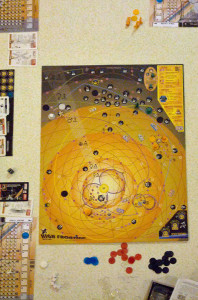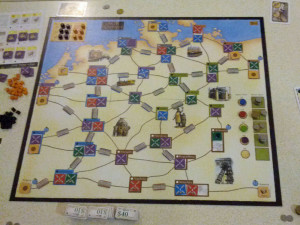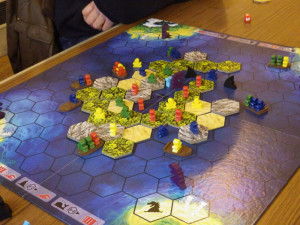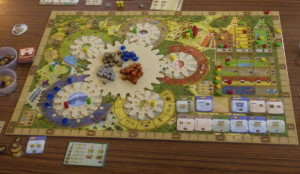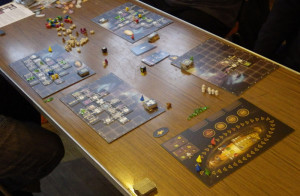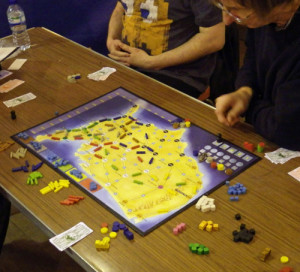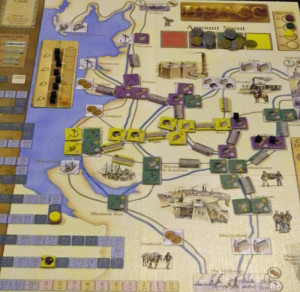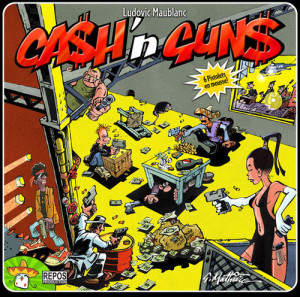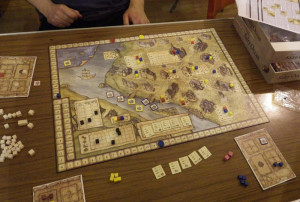A shorter-than-usual session report from me this time, as it was a shorter-than-usual gaming session (for me at least); due to prior commitments, I couldn’t get to Newcastle until 7:30 this week, which meant I could only squeeze in a couple of games…
Agricola
I’ve been promising to play a game of ‘gric with Michael for 6 months or more… but for one reason or another, it’s never quite happened (mostly due to Michael being at the club on weeks that I didn’t have ‘gric in the bag… ‘gric being in the bag on weeks where Michael wasn’t at the club… or game starts and ends just not synching up conveniently). This week we finally got our act together (despite my late arrival — sorry guys!), so the evening’s entertainment began with a four-player Agricola session between yours truly, Michael, Owain and Jerome, using a 4/3 split of E and I decks.
Every game of Agricola ends up being a little bit different. Notable features this time around were…
Higher-than-usual competition for wood: I mean, competition for wood is *always* high in Agricola… but Michael put the Wood Turner occupation into play at the start of the game, and then went on a wood-consuming frenzy. This occpation lets you convert wood into food on a 1-for-1 basis, and (perhaps, in part, due to lack of experience — this was his first ever game) Michael used it as his main food generator throughout; he was grabbing wood at any available opportunity (even small accumulations) and generally making things a bit sparse for the rest of us.
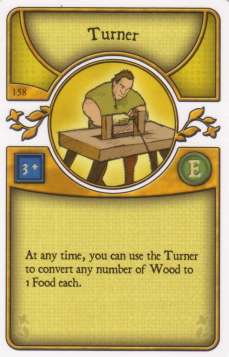
Belated family growth: Family growth didn’t come out until the latest space possible… which always makes the game feel a little bit more constrained, as this makes it significantly harder to build your workforce. Though this was eased a tiny, tiny bit by the presence of…
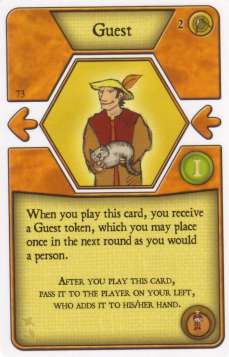
The Guest: Maybe I’ve just been unlucky with the card selection in past games (or simply don’t use the I-deck enough), but those little round guest counters are seldom used in my games of Agricola, so it always seems like a special occasion when the card comes into play and the guest tokens come out. It’s an interesting mechanism, and can give you quite a nice boost if played at just the right time.
I can’t remember much more of note… the I-deck wasn’t being overly interactive on this outing, though Michael had the harrow (which allows other players to plough 2 spaces instead of 1, but only if they pay you food to do so) thereby gaining a new nickname and theme tune…
…but otherwise it was a fairly standard game.
I didn’t have a particularly inspiring hand of cards — I played the Hedge Keeper (gives you 3 bonus fences on each fence build action), the occ-that-adds-an-extra-room-to-a-stone-house (can’t remember the name right now), the Simple Fireplace and the Guest; not a lot of cards, really. I ended the game with a 5-room stone house and only one un-used space on my board, but I didn’t really get a proper food engine running (relying on the simple fireplace, and whatever food I could grab from action spaces), so ended up having to eat most of my livestock in the last round; Owain beat me to first place by 3 points.
Enjoyable game though. Agricola is *always* an enjoyable game!
And then: Galaxy Trucker
Another outing for my christmas pressie… and the first play for Jerome, Owain and Michael. The first mission went surprisingly smoothly — we used the “training mission” card set, and everybody made it to the end of the test flight relatively (and unusually!) unscathed.
So, we went into round 2… everybody was pretty much up to speed with the way the game worked this time; there was a bit of good-natured cursing when the time limit kicked in, and the flight was considerably tougher with significantly larger losses all round… but we all made it to the end of the course and picked up our credits.
Round 3… flushed with confidence and bravado, Michael pushed the timer towards an early finish during the building phase. His space ship certainly looked impressive. It had a huge crew. Lots of components. “I’m really happy with that”, he declared, as he took pole position on the starting grid…
…only to fly straight into a meteorite, and watch the entire right-hand side off his ship sheer off due to a critical weakpoint in his design.
Well, the rest of the flight wasn’t kind to Michael either. Meteors, space pirates, and more meteors all took their toll. By the end of the flight, his spaceship (which DID, nevertheless, complete the mission) looked like this:
If you’re not familiar with galaxy trucker… well, ignore all the empty squares on that board… you see that single tile, with a single astronaut sitting in it? That’s what’s left of Michael’s ship… he didn’t even have a engine left attached to his vessel, and completed the course purely by virtue of forward momentum built up before the important bits fell off.
It wasn’t a complete failure though… the “compactness” of his final ship meant he picked up the prettiest ship bonus points for having the fewest exposed open connectors at the end of the round 😉
I like Galaxy Trucker. It does seem a bit unfair and arbitrary at first, but it’s surprising how robust and mission-proof your ships become with a little bit of practice. You DO need the ability to laugh at your own misfortune when it all goes wrong though. If you’ve got a group with the right sense of humour it’s a lot of fun, and can leave you with some good gaming stories to tell.
(Pro tip: in the final round, always pack LOTS of firepower!)
And that was it… quarter to midnight and it was time to go home! Hopefully I’ll be there for the start next time; it’s another free-for-all week … an evening of quality gaming, completely gratis. Well, it would be rude not to 🙂
CREDITS: Session pics taken by Owain. Newcastle Gamers meets on the second and last Saturday of the month. Usual cost is £3 (or £1 for concessions), but your first visit is free … check our G+ group for more info.
+++ SPECIAL BONUS FEATURE +++
Nantwich Gamers, 25th January
So… the reason I was so late to Newcastle Gamers was because Mrs Shep & myself spent most of Saturday in the Cheshire town of Nantwich, watching the Holy Holly Day celebrations and Sealed Knot battle re-enactment (video to follow!). This trek necessitated spending the Friday night in a Travelodge, just off the M6. The weather forecast was bad — really bad — so we set off early in the day, and planned to hole up in the Travelodge until the next morning. What better way to while away some hours in a potentially-snowed-in hotel than… take some boardgames with us!
Here’s what we played:
Agricola – All Creatures Big and Small / More Buildings Big and Small

I’ve always been fond of this game… and the small box makes it brilliant for shoving in an overnight bag for a hotel stop-over. We’ve actually managed to play 2-player full-size Agricola on a Travelodge table in the past (when we were going through the height of our Agricola addiction)… but it’s a bit of a struggle, and this version is much easier to deploy in confined conditions.
One of the new buildings that we pulled out for this play is the Dog House, which I built during the first round of the game. The dog house allows you to keep sheep on un-used squares, but ONLY if the squares aren’t adjacent to the forrest. This added a very different spin to my game; it meant I could start grabbing sheep really early (and made land expansions even more attractive than they normally are) … BUT, added a really interesting dynamic of having to judge when it was a good time to switch from having an undeveloped (sheep-friendly) space to a more profitable developed square. It was a very interesting/tricky thing to gauge… and I absolutely loved it — best game of ACBAS I’ve played in a while.
In the end, Mrs Shep beat me by a single point — making a grab for the half-timbered house in the last round, and _just_ nudging into the lead. Curses!
(Its probably time to review my current BGG rating of ACBAS, in light of the way that the expansion has improved it even further. I mean, the original was very impressive, but the tactical variety that the expansion (occasionally) throws out out you elevates the experience to a whole new level. I can’t recommend it highly enough. Great stuff!)
Fifes and Drums
Another game (or, rather, game system) that travels remarkably well is a decktet set, as pictured above (yep, that’s actually my own photograph for a change!). I can easily fit my own deck and chips inside the Agricola:ACBAS box, along with all the ACBAS and MBBAS stuff. Perfect!
We fancied trying something we hadn’t played before. Fifes and Drums seemed like a good candidate… after all, we were in town to watch a battle re-enactment, and Fifes and Drums is all about a battle. Or, rather, about retreating from a battle. Here’s the official game blurb
It is the last battle in the final campaign of a mad but brilliant general. Six companies of tired soldiers are all that stands between him and the advancing enemy. He doesn’t realize it yet, but there is no way for him to win.
Fortunately, you are not playing the general in this game. Unfortunately, you’re not the advancing army either.
Instead, you play a member of the general’s staff. You were offered money by captains of a few of the remaining companies. Maneuver them off the field before the inevitable defeat, and they will pay you handsomely. So cue the fifes and drums! Jigger the retreat orders to put your cronies as far from danger as possible.
The game works like this: There’s a score track, ranging from 1 to 100. Six decktet chips (each representing a different company in the mad general’s army) are placed at the start of the track. Each player is then secretly assigned 3 companies … your objective is to get THOSE three companies as far away from the battlefront (square 1) as possible before the game ends. Due to the way that companies are assigned (using the decktet’s 3-suited pawn and court cards) it’s possible for you and your opponent to have a shared interest in one or two of your units — though you’ll always have at least one (usually more) unit that’s not in common.
Three cards are dealt onto the table — these are the 3 available orders that can be given to the army units on a given turn. The double-suited cards allow you to move the two depicted companies in the direction(s) of your choice (towards or away from the battle). The ace cards allow the depicted unit to do a “forced” march, up or down the track (i.e. they keep moving until they meet another unit)… and the “crown” cards… well, they’re sort of interesting; when there’s a crown card in the display, it means the general wants that particular army to engage the enemy… so, all the time that a crown is showing, the relevant army can only move towards the battlefront, not away from it. When the crown card is finally used to issue an order (rather than just left sitting in the command display), it makes the relevant unit perform a “forced” march move, towards the battlefront.
What ensues is an odd game of bluffing, counter-bluffing, and mis-direction… with each player giving orders to try to improve their own situation and worsen the opponents (assumed) situation, while generally trying to obfuscate all their intents and motivations.
I successfully guessed Mrs Shep’s units quite early in the game, and identified the one that we had in common … deliberately nudging that one in the wrong direction from time to time, just to keep her guessing. (Ineffectually, as it turned out, as she’d already guessed we shared that one too). Nevertheless, in the final reckoning I managed to steal a small victory… Mrs Shep had only correctly guessed two of my units, while I’d sussed out all three of hers.
It was an interesting and clever game, and very different from the other decktet titles that I’ve played… but it wasn’t really my kind of thing; I’m not a huge fan of bluffing games, and I don’t think it’s one that I’ll revisit in a hurry — there are other decktet games (Emu Ranchers, Yay!) that we rate far higher. It’s always nice to try something new though!
And: Some of that high-tech digital game nonsense
Mrs Shep decided to curl up with a good book at this point, so I rounded off the evening’s gaming with some iPad boardgaming in the shape of Alien Frontiers (which I’m still quite fond of despite its weak/cheaty AI) and Le Havre — which is a lovely, lovely translation of the cardboard version, and an essential purchase for any Uwe-Rosenberg-loving iPad owner.
Not a bad way to hide from the bad weather, all said and done 🙂

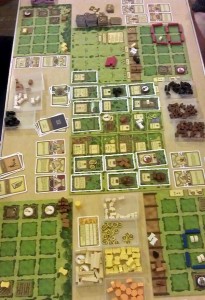
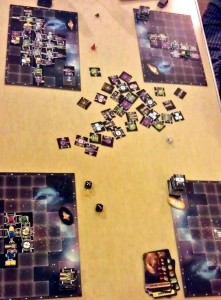
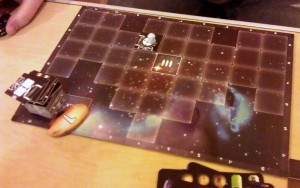
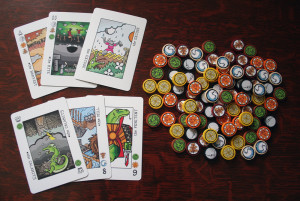
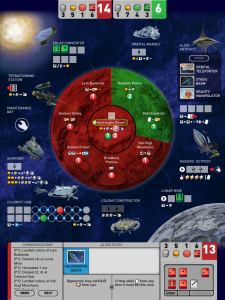
 Follow
Follow
